A cast recording is a recording of a stage musical that is intended to document the songs as they were performed in the show and experienced by the audience. An original cast recording or OCR, as the name implies, features the voices of the show's original cast. A cast recording featuring the first cast to perform a musical in a particular venue is known, for example, as an "original Broadway cast recording" (OBCR) or an "original London cast recording" (OLCR).

Claus Ogerman was a German arranger, conductor, and composer best known for his work with Billie Holiday, Antonio Carlos Jobim, Frank Sinatra, Bill Evans, Michael Brecker, and Diana Krall.
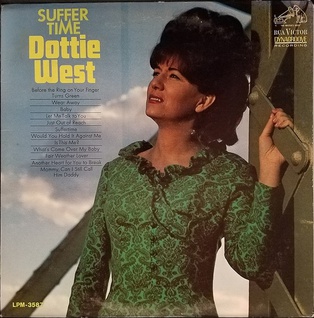
Suffer Time is a studio album by American country music artist Dottie West. It was released in July 1966 on RCA Victor Records and was produced by Chet Atkins. It was West's third studio album as a music artist and was her first concept album in her career. The record's concept focused on themes related to heartbreak and lost love. It included new compositions and cover versions of other recordings. These recordings included four singles, including the top ten hit "Would You Hold It Against Me". Suffer Time would become one of West's most successful and highest-selling albums in her career.

I'll Help You Forget Her is a studio album by American country music artist Dottie West. It was released in November 1967 on RCA Victor and was produced by Chet Atkins. West's seventh studio effort, I'll Help You Forget Her was also her fourth studio offering in 1967. It included the single "Like a Fool", which became a major hit. The album itself would reach peak positions on national publication charts.

The discography of American country artist Skeeter Davis contains 32 studio albums, 18 compilation albums, 59 singles, 53 lead singles, six collaborative singles, two other charted songs and two additional appearances. Davis was first one half of the duo, The Davis Sisters before embarking on a solo career with the RCA Victor label. Her second single was 1957's "Lost to a Geisha Girl", which reached the top 15 of the American Billboard Hot Country Songs chart. It was followed in 1959 by the top five country selection, "Set Him Free". The same year, Davis's debut studio album was issued on RCA Victor titled I'll Sing You a Song and Harmonize Too. Her career momentum continued to build in 1960 with two top five back-to-back singles: "(I Can't Help You) I'm Falling Too" and "My Last Date ". Both selections also climbed into the Billboard Hot 100 top 40. They were featured on Davis's second studio album called Here's the Answer. Between 1961 and 1962, Davis had top ten Billboard country singles with "Optimistic" and "Where I Ought to Be".
"Cabaret" is a song from the 1966 musical of the same name sung by the character Sally Bowles. It was composed by John Kander with lyrics by Fred Ebb.

Downtown Country is the sixth studio album by American country singer Connie Smith. It was released in January 1967 by RCA Victor. Downtown Country was the second of Smith's albums to include string instrumentation to help create a pop-influenced sound. The album also featured the single "The Hurtin's All Over", which reached the top five of the Billboard country chart. The album itself reached the top five of Country LP's chart following its initial release.

Connie Smith Sings Bill Anderson is the eighth studio album by American country singer Connie Smith. It was released in May 1967 by RCA Victor and featured 12 tracks. The album was dedicated to her mentor, Bill Anderson. It contained several songs made popular by Anderson himself, along with several tracks made popular by other performers. It also included the newly-recorded "Cincinnati, Ohio". Smith released her version as a single, which climbed into the top five of the American country songs charts. The album received favorable reviews following its release.

Marilyn Maye McLaughlin is an American singer, musical theater actress and masterclass educator. With a career spanning eight decades, Maye has performed music in the styles of cabaret, jazz and pop music. She has received one nomination from the Grammy Awards and had commercial success as a recording artist.
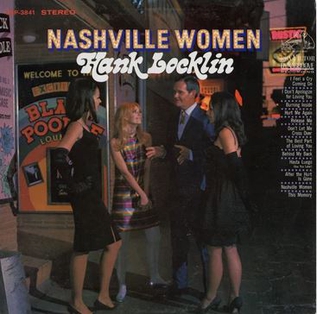
Nashville Women is a studio album by American country singer–songwriter Hank Locklin. It was released in August 1967 via RCA Victor Records and was produced by Chet Atkins. Nashville Women was Locklin's sixteenth studio recording and contained 12 tracks. Three of the album's tracks were singles that became minor hits on the country chart in 1967. The album itself would also chart following its release. Nashville Women would receive positive reviews from critics and music publications.

Lookin' Back is a studio album by American country singer–songwriter Hank Locklin. It was released in July 1969 via RCA Victor Records and contained 11 tracks. The project was produced by Danny Davis and contained no single releases. Lookin' Back centered around cover songs by country and pop artists of the era. It was Locklin's twentieth studio album release in his career.
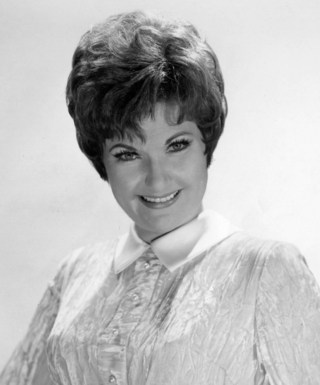
The discography of American singer Marilyn Maye contains 13 studio albums, two compilation albums, two live albums, 13 lead artist singles, two promotional singles and four additional album appearances. Her debut studio album appeared in 1961 called Marilyn...the Most. Signing with RCA Victor, her second studio album was released in 1965 titled Meet Marvelous Marilyn Maye. It was followed in 1966 by the live album, The Second of Maye, and a studio album, The Lamp Is Low.

Meet Marvelous Marilyn Maye is a studio album by American singer Marilyn Maye. It was released in August 1965 via RCA Victor and contained 12 tracks. It was the second album of Maye's career and her first with the RCA label. It contained songs from musicals and also featured covers of jazz vocal standards. It was reviewed positively by Billboard magazine following its release in 1965.

The Second of Maye is a live album by American singer Marilyn Maye. It was released in April 1966 via RCA Victor and it contained 12 tracks. The project was recorded in a live format at The Living Room, a performance venue located in New York City. It was the second album of Marilyn Maye's issued by the RCA Victor label and her first live album. It was met with favorable reviews following its release.

The Lamp Is Low is a studio album by American singer Marilyn Maye. It was released in October 1966 via RCA Victor and contained 12 tracks. The album was a mixture of both original material and cover songs. Of its cover songs were recordings from 1960s films and jazz standards. Among its Jazz tracks was the album's title track. It received positive reviews from Billboard and Cashbox magazines. The album has been considered a "classic" disc since its original release.
"Sherry!" is a song composed by James Lipton and Laurence Rosenthal. It was first recorded in 1966 by American singer Marilyn Maye whose version was released as a single by RCA Victor. It later appeared in the Broadway musical also titled Sherry!. The show premiered in 1967, however, it was never recorded until 2004. "Sherry!" was then recorded for the cast album by American television actress Carol Burnett.
"Step to the Rear" is a song written by Elmer Bernstein and Carolyn Leigh. It was originally performed in the Broadway musical How Now, Dow Jones between 1967 and 1968. It was first recorded on an official cast album in 1968. It was notably recorded by American singer Marilyn Maye, whose version was released as a single. Maye's version reached the top five of the American adult contemporary chart and was seen on televised advertisements for Lincoln and Mercury cars. It was adapted into the University of South Carolina’s fight song as The Fighting Gamecocks Lead the Way.
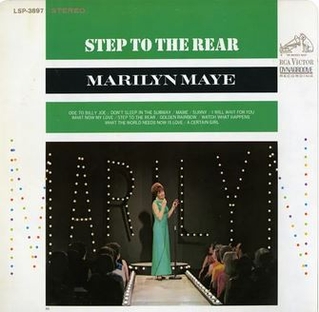
Step to the Rear is a studio album by American singer Marilyn Maye. It was released in November 1967 via RCA Victor and contained 11 tracks. Its title song was taken from the Broadway musical How Now Dow Jones and was a single for Maye in 1967. It reached the top five of American adult contemporary chart. The album itself received a positive review from Billboard magazine following its release.

The Happiest Sound in Town is a studio album by American singer Marilyn Maye. It was released in September 1968 via RCA Victor and contained 11 tracks. It was the sixth studio album of Maye's career featuring songs that were categorized as easy listening material. It featured cover of popular recordings along with new material.
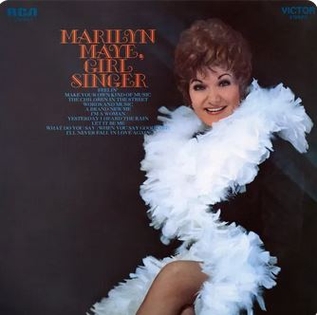
Marilyn Maye, Girl Singer is a studio album by American singer Marilyn Maye. It was released in April 1970 via RCA Victor and was the seventh studio album of her career. It was also her final album released by RCA Victor. Girl Singer contained a total of 11 tracks. Two tracks were originally singles. The 1968 single "Feelin'" became a top 20 song on the American adult contemporary chart. Girl Singer was given a positive review from Record World magazine following its release.
















